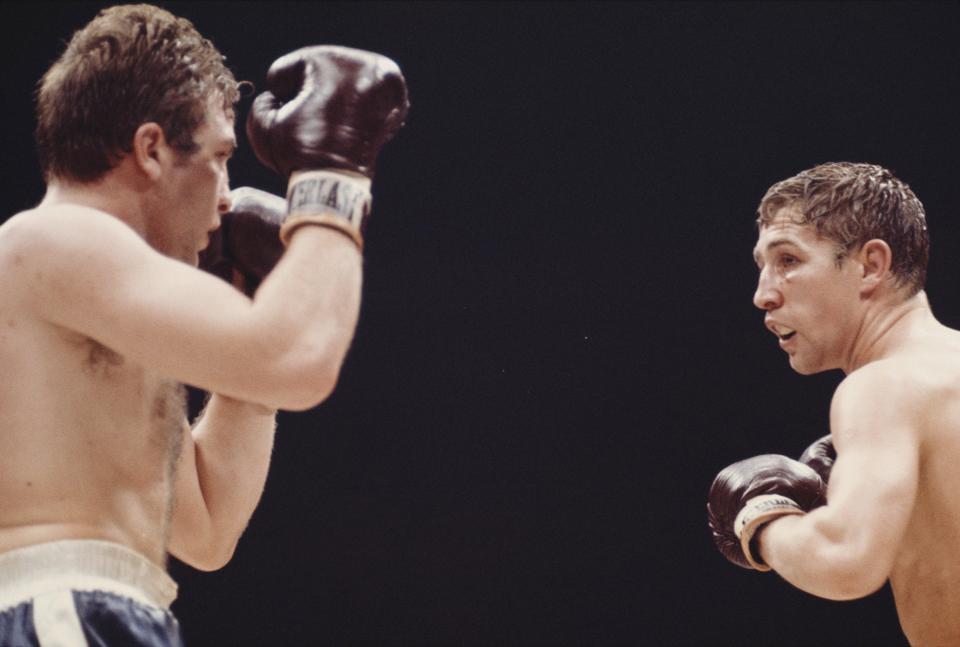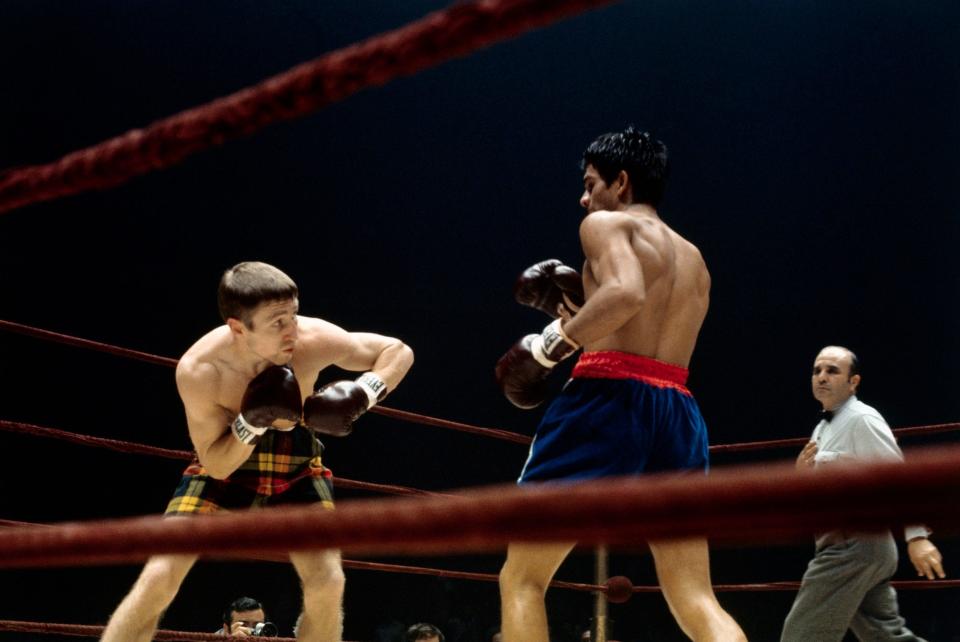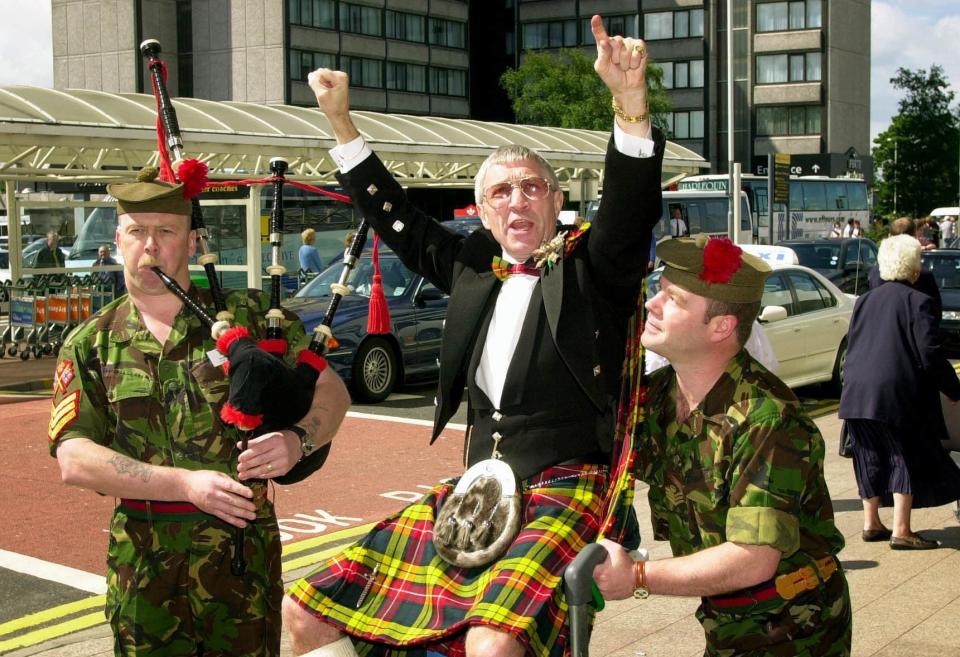Ken Buchanan, former undisputed world lightweight boxing champion – obituary

Ken Buchanan, the former undisputed world lightweight champion who has died aged 77, was not only the greatest 9 stone 9lb fighter Scotland ever produced, he was also perhaps the finest British lightweight of all time.
Tall and stylish and invariably clad in tartan shorts, Buchanan’s sublime skills and fighting heart swept him to the pinnacle of his profession in 1971, yet his time at the top was brief and he was always more respected in the United States than in Britain.
A combination of ill-luck and bad business decisions saw him living out his final years on a Glasgow housing estate plagued by money worries and alcohol dependency.
Born at Portobello, Edinburgh, on June 28 1945, Buchanan did not hail from a boxing family but his passion for the sport was ignited when his father took him to the local cinema to see a film on the former world heavyweight champion Joe Louis.
The scrawny young schoolboy joined the Sparta amateur boxing club at eight, competing in shows all around the country. His dedication took him all the way to the Amateur Boxing Association featherweight title in 1965, prompting him to turn professional under the Welshman Eddie Thomas.
Launching his pro career with a second-round stoppage of Brian Tonks at Piccadilly on September 20 1965, Buchanan made swift progress. On February 19 1968 he secured the British light-welterweight crown in his 24th paid outing by knocking out Maurice Cullen in the 11th round at Mayfair.
“I think I cried, but I can’t remember right,” he recalled. “It was such a powerful moment in my life. I looked over at my dad. How must he have been thinking? Here was his son, a stick insect at eight – skin an’ bone. Three and a half stone at his first fight. Here he was winning the British title.
“The rest of the crowd could’ve been doing the hokey-cokey and we wouldn’t have noticed.”
Yet his elation was short-lived. For all his hard graft, Buchanan quickly discovered that the financial rewards of becoming a British champion were pitifully small. Moreover, his burgeoning reputation meant a dearth of domestic challengers.
At one point he even returned his Lonsdale Belt to the British Boxing Board, threatening retirement. It took the death of his mother, Cathy – his most loyal supporter – to set Buchanan back on the path to a world title.
“I told (Eddie) I wanted to be champion so that when I visit my mum’s grave I can show her my world championship belt,” he said.
Yet Buchanan subsequently suffered his first loss in a European lightweight title showdown with Spain’s Miguel Velazquez in Madrid on January 29 1970.

Despite being some way off his best, a weight-drained Buchanan denounced his points defeat as a robbery. “There are as many robbed boxers in the fight game as there are innocent men in Barlinnie Prison,” he said. “This was a classic case of daylight robbery in the middle of the night.”
He had little time to dwell on his misfortune as on September 26 1970 he took on Panama’s Ismael Laguna, the World Boxing Association champion, in the searing heat of San Juan, Puerto Rico.
Despite being the underdog and suffering a cut above his left eye, Buchanan upset the champion’s rhythm by fighting in bursts and, with three rounds remaining, there was little in it.
He then changed tactics by electing to go for broke in round thirteen. By the fifteenth and final round, with both men, according to Buchanan, looking “like a butcher has done a job on our faces with a meat cleaver”, the Scot felt he had passed the limit of his endurance.
The pair went toe-to-toe in the final three minutes with Buchanan – fighting with both eyes almost closed – later recalling how the final thirty seconds seemed to last longer than the rest of the fight put together. When his hand was raised in victory Buchanan collapsed into his father’s arms and wept.
“There we were – two ordinary men from ordinary backgrounds – in the middle of a Caribbean island, champions of the world,” he wrote. “The first words I remember uttering to him were, ‘I hope Mum was watching, Dad’.”
However, Buchanan’s joy at his unexpected victory was somewhat tempered by his arrival home at Edinburgh airport to be greeted by only family and friends. “It took me a few seconds to realise (it) was devoid of press,” he said. “I felt let down, thinking the country I loved so much had snubbed me.
“The next day I learned that nobody had known about the fight, none of the general public, that is. The Scottish papers practically ignored it.”
On February 12 1971, Buchanan travelled to Los Angeles to take on Reuben Navarro in a clash which had both the WBA and World Boxing Council belts on the line.
Although the American proved one of Buchanan’s roughest opponents, the Scotsman’s superior class and work-rate engineered a wide points victory. The kid from a pre-fab in Edinburgh was now the undisputed world lightweight champion.
This time Buchanan was greeted on his arrival at Edinburgh by hundreds of fans decked out in tartan: “It brought a tear to my eye. I was like a big lassie. I couldn’t wait to get off and greet them all.”
Buchanan was subsequently appointed MBE.
Another win in New York over Laguna paved the way for what proved a fateful world title defence against Roberto Duran, the undefeated Panamanian, at Madison Square Garden on June 26 1972, a fight that will forever be remembered for its controversial ending.

Duran was leading on all three scorecards at the end of the 13th when both men exchanged blows after the bell, Buchanan going down writhing in agony from an apparent low blow. His trainer, Gil Clancy, insisted it was caused by a knee to the groin, but referee Johnny LoBianco awarded the fight to Duran, insisting that the blow had been legitimate and that Buchanan would not have been able to continue.
Buchanan insisted that Duran had caught him with an illegal punch which drove his protector into his groin. The fallen champion would be haunted by those few moments for the rest of his life. “Everybody around me was seething with anger,” he said. “The whole place knew I was robbed.”
Buchanan’s burning sense of injustice increased when Duran failed to honour a contract for a rematch. “That hurt more than the bad decision,” he said.
It proved a very long road back for Buchanan. He pieced together a string of victories including a points triumph over compatriot Jim Watt in a British title fight before capturing the European title by overcoming Italy’s Antonio Puddu in Cagliari.
Three years after the Duran loss, Buchanan found himself travelling to Tokyo to challenge Japan’s Guts Ishimatsu for the WBC crown on February 27 1975. Following a spirited encounter with Buchanan – who had picked up an eye injury in sparring – again acquitting himself well, Ishimatsu was judged the victor.
Buchanan received a more serious setback en route to a 12th round stoppage of Italian Giancarlo Usai at Cagliari on July 25 1975 when the referee inadvertently poked him in the eye. His vision badly distorted, Buchanan suffered considerable punishment during the closing stages of the fight before ending the Italian’s challenge – only for the crowd to riot. The victor had to fight his way to the sanctuary of the dressing room.
These events, during which his father sustained a head injury and his European title belt was stolen, prompted a disillusioned Buchanan to announce his retirement. He finished as undefeated British and European champion.
Buchanan tried to adjust to life after boxing. Already the owner of an Edinburgh hotel, he subsequently opened a restaurant there and took out a boxing manager’s licence. However a costly divorce saw him having to sell the hotel.
The inevitable comeback followed. Buchanan returned to the ring with a win over American Benny Benitez in Denmark in June 1979, only to lose a European title fight against Irishman Charlie Nash six months later.
He had six more bouts, but having lost on points on January 25 1982 to George Feeney in Piccadilly he announced his final retirement.
He had won 61 of his 69 bouts against only eight defeats.
Buchanan then tried to concentrate on his trade as a joiner, but could not resist taking a couple of fights on the unlicensed circuit; nor could he exorcise the spectre of Duran from his mind and he became consumed with the notion of a rematch.
In August 1995 he flew to New York and booked himself into a room in the black neighbourhood of Harlem intent on tracking down his one-time nemesis. Buchanan later recalled how, on learning he was Scottish, a restaurant customer enquired whether he knew the boxer Ken Buchanan.
“A few minutes later the waitress comes up and asks: ‘Is the food all right, Mr Buchanan?” he recounted. “There was uproar. ‘You’re the guy who fought Duran and got punched in the -----’, one of them shouts.” After a fruitless two-week quest for Duran, Buchanan gave up and returned home to Scotland.

He was inducted into the International Boxing Hall of Fame in 2000.
Both Buchanan’s marriages ended in divorce. He is survived by a son and a daughter by his first wife Carol, as well as a son from an earlier relationship.
Ken Buchanan, born June 28 1945, died April 1 2023

